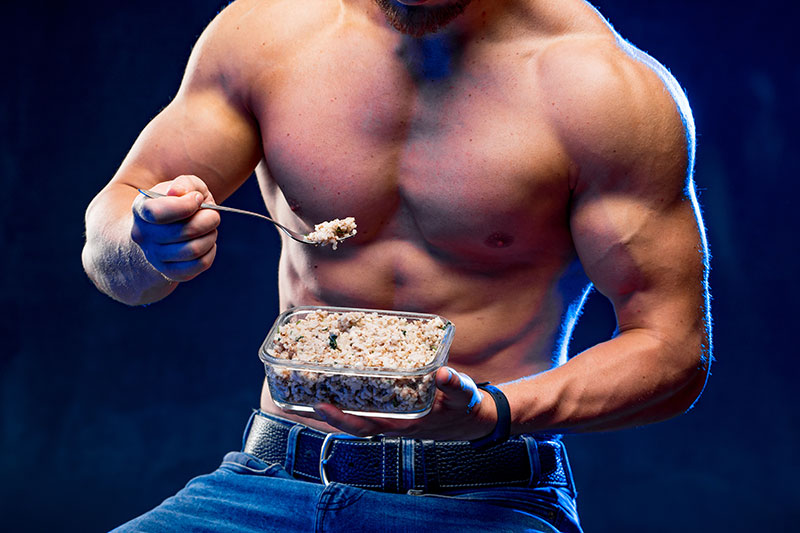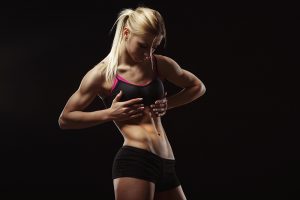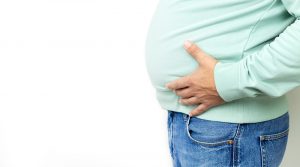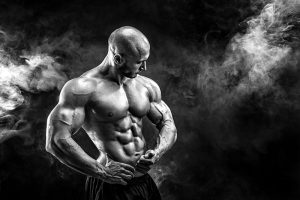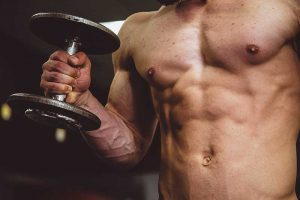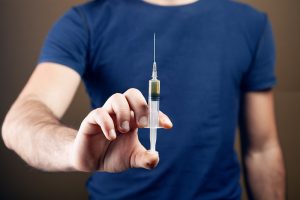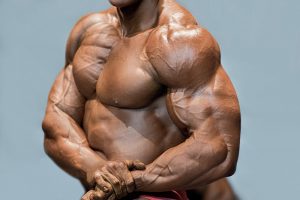The chances are you’ve already done a fair amount of searching about anabolic foods by now. With so much misinformation online (and from the guys down the gym), it can be difficult to know what makes up the best anabolic diet meal plan.
If you’re new to the world of an anabolic diet – In short, an anabolic diet meal plan is a low-carb diet focused on alternating between low and high carb days.
Developed by seasoned powerlifter DiPasquale, an anabolic diet is designed to help bodybuilders gain a huge amount of muscle mass, with very little fat.
Why is it called the “anabolic diet” exactly? Well, according to DiPasquale, he believed that cycling carbs could produce results similar to popular anabolic steroids.
But, is an anabolic fasting diet plan all its cracked up to be? We take a look.
How does an anabolic diet meal plan work?
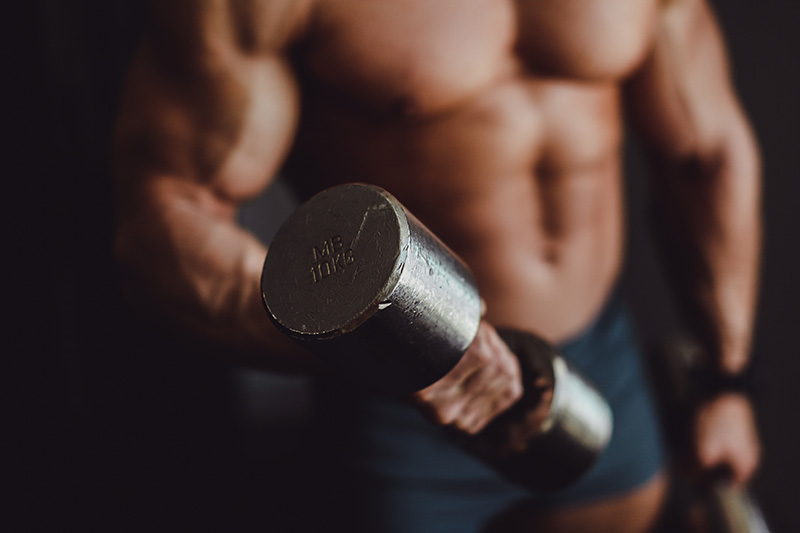
Put simply, DiPasquale claims that alternating carbs encourages the body to burn more fat as fuel, allowing you to retain as much muscle mass as possible.
Usually, our diet consists of three key macronutrients:
- Fat
- Carbohydrates
- Protein
However, for those looking to compete, whether athletes, bodybuilders or weightlifters, this type of diet can raise concerns. Since many guys want to cut as much weight as possible, while maintaining their muscle gains. So, in this instance, an anabolic diet isn’t going to send you crazy with a super restrictive calorie count.
When it comes to keeping hold of your hard-earned muscle gains, your body needs calories in order to maintain muscle. So if you were to dive in with a calorie deficit, you could start to lose lean muscle mass. Instead, the aim of an anabolic diet is to allow you to eat a normal amount of calories, while still achieving a lower body fat percentage.
The phases of an anabolic diet meal plan
In order for this anabolic diet to work, it needs to be carried out in phases. Of course, there is a method behind this – with each one designed for a purpose, whether:
- Maintenance
- Gain
- Weight loss
Maintenance and induction phase
The maintenance and induction phase is designed to ease you into an anabolic diet meal plan. It is suggested you follow this phase for weeks 1 to 4, with a calorie intake 18 times your body weight in pounds.
Also Read: The best cutting diet (with a meal plan)
Think of this as a way of familiarizing your body with a low-carb intake at the start of an anabolic diet, before using it as a maintenance level throughout.
Bulk phase

After the induction phase, your anabolic fasting diet plan heads into a bulk phase – helping you achieve a desired bulk weight. Unlike the induction phase, there is no strict window to complete the bulk phase. Although, it is encouraged that those following this type of anabolic diet stay in the bulk phase until they achieve their weight gain goal.
Not sure how much bulk you should be aiming to add? According to DiPasquale, take your ideal body weight in pounds and add on 15%.
Since you’ll be heading into the cutting phase of your anabolic diet meal plan shortly after, going above your ideal body weight can be beneficial for fat loss later on.
Popular safe and legal steroid alternatives
Cutting phase
Essentially, the cutting phase of your anabolic fasting diet plan is a low-carb weight loss plan. During this period, it is recommended that you cut 500 to 1,000 calories from the maintenance phase.
How long does the cutting phase last?
Much like the bulking phase of your anabolic diet, the cutting phase can last until you hit your body fat percentage goal. Many guys in this instance aim for less than 10%.
Although the calorie intake levels differ slightly across each anabolic diet phase, the macronutrient proportions don’t really change too much.
Next, we’ll take a look at how an anabolic diet meal plan looks, since we already know that it is based on nutrient cycling – in short, it’s low-carb on weekdays and high-carb on the weekends. By switching between the two it prevents the body from returning to burning predominantly carbs for fuel, while high-carb days refuel your body with fuel lost during exercise.
How weekday/weekend phases work during your anabolic fasting diet plan

During weekdays, your focus should be on limiting your carb intake (at a maximum of 30 grams each day), while your calorie intake should be mainly sourced from fat and protein. Ideally, the breakdown would look a little like this:
- 60 to 65% fat
- 30 to 35% protein
- 5 to 10% carbs
After completing your anabolic diet weekdays of low-carb, the weekend’s high-carb is designed to help replenish carb stores in the body. On the weekend, your breakdown would look more like this:
- 60 to 80% carbohydrates
- 10 to 20% fat
- 10 to 20% protein
Are there any risks associated with an anabolic diet?
Like any type of new diet plan, the anabolic diet should only be followed for a short amount of time. It is definitely not a long-term strategy for gaining muscle mass and cutting fat. If you’re a weightlifter or bodybuilder preparing for a competition, this short-term strategy may be suitable.
While an anabolic diet meal plan is designed to increase lean body tissue while lowering fat stores, it doesn’t necessarily mean this type of diet is healthy. While cycling carbs, the main drawback of the anabolic diet is its lack of fiber and micronutrients – since it contains little fruit, vegetable and legume intake.
Despite many following an anabolic fasting diet plan, this imbalance can result in a decreased intake of antioxidants, which are crucial for combating oxidative stress as a result of exercise. While the weekend phase allows high-carbs, zero fruits, legumes and very few vegetables are recommended for weekdays.
With a recommended 60 to 65% calorie from fat intake, even a moderate amount of time spent on the anabolic diet could lead to insufficient insulin function.
What’s the right amount of fat intake on the anabolic diet?

Dietary fat, especially a high intake of saturated fat, is known to positively regulate testosterone and androgen production. While the impact of these changes is relatively minor, DiPasquale claims that saturated fats are essential for optimal hormone production.
On weekdays, he suggests a high intake of the following:
- fatty cuts of red meat
- full-fat dairy products such as cheese, cream, and butter
- oils
- nuts
- whole eggs
- nut spreads
Compared to mono- and polyunsaturated fats, saturated fats increase cholesterol and triglyceride levels – which increases cardiovascular risk.
Not sure what anabolic foods and meals you can enjoy? Don’t worry. We’ve put together a sample weekday anabolic fasting diet plan you can started with right away.
Anabolic diet meal plan
Calories: 2300
Fats: 60 to 65%
Protein: 30 to 35%
Carbohydrates: 5 to 10%
Meal one: Breakfast
- 3 whole eggs
- 1 oz of cheddar cheese
- 1 tbsp of oil
- 2 links turkey sausage, cooked
Whisk the eggs and cheese. Add in 1 tablespoon of oil and serve with sausage links.
Also Read: Should you eat protein before bed to build muscle?
Nutrition: 511 calories, 43.5 g fat, 28.7 g protein, 1.4 g carbs
Meal two: Snack
- 1 tbsp of almond butter
- 1 tbsp of flaxseed meal
- 6 oz. 1% cottage cheese
- 1 tbsp of oil
Serve cottage cheese with almond butter, flaxseed meal with oil mixed in.
Nutrition: 410 calories, 28.4 g fat, 28.3 g protein, 11.5 g carbs
Meal three: Lunch
- 4 oz. cooked chicken breast
- 1 hard-boiled egg
- 2 cups romaine lettuce
- 2 tbsp. oil
- 1 tbsp. Vinegar
Serve chicken breast and egg over lettuce. Toss with oil and vinegar.
Nutrition: 508 calories, 35.8 g fat, 42.5 g protein, 3.8 g carbs
Meal four: Snack
- 4 oz. ground beef
- 1 oz. cheddar cheese
- 2 tbsp. peanut butter
Cook the ground beef with the cheddar cheese. Serve with peanut butter as a side.
Nutrition: 513 calories, 32.6 g fat, 49.5 g protein, 6.7 g carbs
Meal five: Dinner
- 4 oz cooked chicken breast
- 2 cups of romaine lettuce
- 1 tbsp of flaxseed meal
- 1 tbsp of oil
- 1/2 tbsp of vinegar
Whisk the flaxseed meal with oil and vinegar. Toss with lettuce and serve with chicken breast.
Nutrition: 352 calories, 20.4 g fat, 38.5 g protein, 5.4 g carbs
Should you follow an anabolic diet?
With plenty of anabolic foods (as you’ve seen in our anabolic diet meal plan) available to you, the anabolic diet can be beneficial for those seeking huge fitness gains. However, when it comes to competitive athletes with higher carb needs, it may not be suitable.
If your aim is solely weight loss, an anabolic diet may also not be suitable. While it’s highly likely that you’re here looking for the best way to get shredded, an anabolic diet shouldn’t be followed for a long period of time. Since it is highly restrictive and limited in nutrients, this type of diet may only be suited for hitting a specific goal over a short period of time.
Get shredded the healthy way with Brutal Force

Unsure if an anabolic diet is the right way to go? Uncertain if you’re going to lose out on crucial nutrients and antioxidants? No problem, there is another way.
If you’re looking to build muscle, get shredded and cut fat, Brutal Force can help. Our 100% natural and safe alternatives to anabolic steroids and SARMs are 100% safe – with zero side effects.
Get ready for extreme GAINS.



